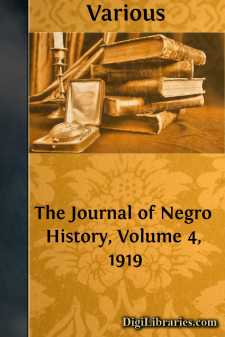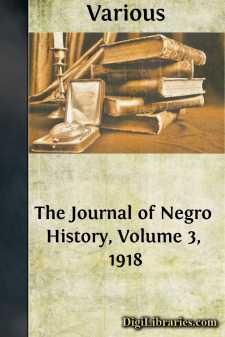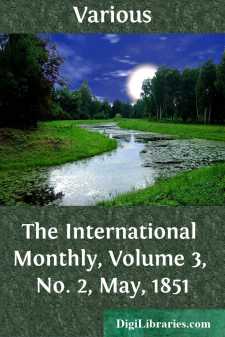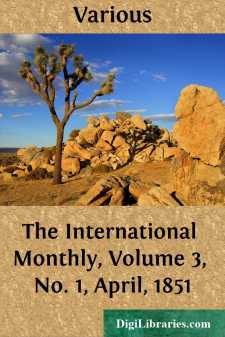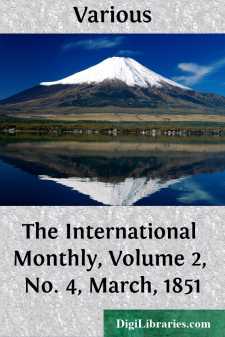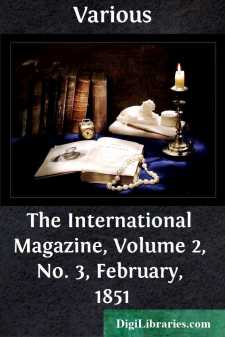Periodicals
- Art 27
- Children's periodicals 59
- Entertainment 5
- Food/Wine 2
- Games/Humor 455
- General 661
- Health 1
- History 53
- House/Home 1
- Regional 62
- Science/Nature 118
- Transportation 10
Periodicals Books
Sort by:
by:
Various
PRIMITIVE LAW AND THE NEGRO The psychology of large bodies of men is a surprisingly difficult topic and it is often true that we are inclined to seek the explanation of phenomena in too recent a period of human development. The truth seems to be that ideas prevail longer than customs, habits of dress or the ordinary economic processes of the community, and the ideas are the controlling factors. The...
more...
by:
Various
THE STORY OF JOSIAH HENSON No one ever uttered a more forceful truth than Frederika Bremer when she said in speaking to Americans: "The fate of the Negro is the romance of your history." The sketches of heroes showing the life of those once exploited by Christian men must ever be interesting to those who would know the origin and the development of a civilization distinctly American. In no case...
more...
by:
Various
I. The Origin and Extent of Slavery in the Several Economic Zones of Africa Slavery in Africa has existed from time immemorial, having arisen, not from any outside influence, but from the very nature of the local conditions. The three circumstances necessary to develop slavery are: First, a country favored by the bounty of nature. Unless nature yields generously it is impossible for a subject class to...
more...
by:
Various
The Negroes of Cincinnati Prior to the Civil War The study of the history of the Negroes of Cincinnati is unusually important for the reason that from no other annals do we get such striking evidence that the colored people generally thrive when encouraged by their white neighbors. This story is otherwise significant when we consider the fact that about a fourth of the persons of color settling in the...
more...
by:
Various
GEORGE WILKINS KENDALL. We have here a capital portrait of the editor in chief of the New Orleans Picayune, George W. Kendall, who, as an editor, author, traveller, or bon garçon, is world-famous, and every where entitled to be chairman in assemblies of these several necessary classes of people. Take him for all in all, he may be described as a new Chevalier Bayard, baptized in the spirit of fun, and...
more...
by:
Various
JAMES FENIMORE COOPER. The readers of the International have in the above engraving, from a Daguerreotype by Brady, the best portrait ever published of an illustrious countryman of ours, who, as a novelist, take him all in all, is entitled to precedence of every other now living. "With what amazing power," exclaims Balzac, in the Revue de Paris, "has he painted nature! how all his pages...
more...
by:
Various
AUSTEN HENRY LAYARD, LL. D. In an early number of the International we had the satisfaction of printing an original and very interesting letter from Dr. Layard, in which, with more fulness and explicitness than in his great work on Nineveh, he discusses the subject of Ancient Art. We have carefully noted from time to time his proceedings in the East, and our readers will remember that we recently gave...
more...
by:
Various
KOSSUTH. On the preceding page is the best portrait we have seen of the illustrious Hungarian, whose presence in America is destined to mark one of the brightest pages in the history of Liberty. Of his personal appearance we transcribe the description in the Tribune. He is taller than had generally been supposed, and his face has an expression of penetrating intellect which is not indicated in any...
more...
by:
Various
Of the revolutions of the age, one of the most interesting and important is that which has taken place in the forms of Literature and the Modes of its Publication. Since the establishment of the Edinburgh Review the finest intelligences of the world have been displayed in periodicals. Brougham, Jeffrey, Sidney Smith, Mackintosh, Macaulay, have owed nearly all their best fame to compositions which have...
more...
by:
Various
THOMAS CHATTERTON. In the history of English literature there is no name that inspires a profounder melancholy than that of the "marvellous boy" Chatterton, of whom it must be said that in genius he surpassed any one who ever died so young, and that in suffering he had larger experience than almost any one who has lived to old age. Shelley says of him:"'Mid others of less note came one...
more...


